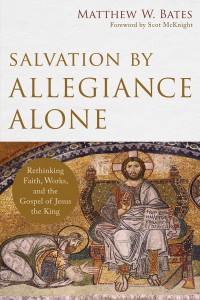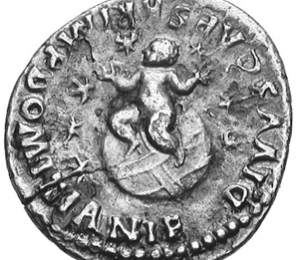 If you spend any time talking to me about the Trinity, you’ll know that I’m quick to recommend Matthew Bates’s book, The Birth of the Trinity. This book received wide acclaim from various tribes, and it’s on many people’s lists of go-to works on the Trinity and the early church. His new book, however, is getting a little more heat. I was provided a review copy of the book, and it’s certainly worth dealing with—whether one ends up agreeing with Bates’s proposal or not.
If you spend any time talking to me about the Trinity, you’ll know that I’m quick to recommend Matthew Bates’s book, The Birth of the Trinity. This book received wide acclaim from various tribes, and it’s on many people’s lists of go-to works on the Trinity and the early church. His new book, however, is getting a little more heat. I was provided a review copy of the book, and it’s certainly worth dealing with—whether one ends up agreeing with Bates’s proposal or not.
In Salvation by Allegiance Alone, Bates seeks to nuance or expand upon the traditional Reformation doctrine of sola fide (“faith alone”). In short, he argues that the Greek word pistis (often rendered “faith”) needs a fresh look. Bates makes the point that though we are saved by faith alone and not by works, it’s more right to say that we are saved by allegiance alone to King Jesus. So for Bates, faith isn’t just a one-time assent to belief, but rather is ongoing, with works as a necessary vehicle toward final justification.
One of Bates’s fundamental arguments is that Jesus’s enthronement and rule is not external to the gospel (as is commonly assumed), but part of the gospel proper. For Bates, this is why responding in “faith” to the gospel involves responding in “allegiance” to a king—when Jesus’s kingship is wrongly excluded from the gospel, the result is that pistis as it relates to the gospel is misunderstood.
Tom Schreiner, whose recent book on faith alone was a huge help in my writing of Echoes of the Reformation, wrote a winsome but critical review of Bates’s new book at The Gospel Coalition. A snippet:
Salvation By Allegiance Alone is full of helpful insights, and space is lacking to interact with everything Bates writes. His emphasis on submission to Jesus as King, the enthroned Lord of the universe, nicely captures the New Testament emphasis on what it means to be a Christian. He also reminds us that our lives in this world matter, and that idolatry isn’t an abstraction but shows up in how we live. We aren’t disembodied entities; we’re flesh-and-blood creatures anticipating new-creation life. Bates rightly says the gospel is broader than simply receiving Jesus as Savior, and he emphasizes God’s grace in saving us. I also sympathize with his emphasis on allegiance; too many Protestants reduce faith to mere verbal agreement. Many are mistakenly assured they’ll enjoy eternal life apart from any obedience if they accept Jesus as Savior. Bates convincingly demonstrates that such a reading doesn’t accord with the New Testament’s emphasis on works, for works are clearly essential for the reception of eternal life. We must maintain our faith until the end to be saved.
Despite the advantages of the word “allegiance,” though, I still believe “trust” or “faith” is better since “allegiance” puts the emphasis squarely on the human subject—on what we do, on our commitment. “Allegiance” captures the importance of subsequent good works, but it leaves something out as well, for faith is fundamentally receptive. We receive the gift of righteousness with an empty hand, and this conception is absent when we put “allegiance” in place of “faith.” Similarly, the notion that true faith or trust inevitably leads to good works handles the New Testament witness in a more fitting way.
You can read the rest of the review here. Schreiner’s pushback is three-fold: (1) Bates’s book offers a substandard view of justification; (2) the Arminian-like view of corporate election over individual election is lacking nuance; and (3) the insinuation in the book that one can possibly lose his salvation (Bates would say “they ceased giving allegiance”) is unbiblical. All of these critiques by Schreiner are reasonable, and to Bates’s credit, he gives a biblical defense of these matters that the reader will need to engage for himself.
That said, perhaps Bates could have done a better job anticipating these sort of critiques, given that he’s dealing with Reformed categories and trying to nuance or rework them. In Chapters 2, 4, and 8 particularly, Bates spends a good deal of time engaging the biblical warrant for “faith,” justification, the ordo salutis, etc. But Bates’s issue is that writing a book trying to challenge well-worn theological paths runs the risk of being too assertive in some areas, and too vague in others.
Scot McKnight, who wrote the foreword to the book, wrote a more positive review. This is not surprising because (1) McKnight wrote the foreword, and (2) because this book would fall more in line with his theological positions. That said, McKnight makes a good case for why we should consider Bates’s work. Here’s a snippet from McKnight’s review:
For sure, it pokes the Reformation slogan — faith alone — in the eye, but it does so by out-Reforming the Reformation crowd opposing this new book. How so? In true Reformation fashion, this book takes us back to the Bible to ask “What does faith mean in the Bible?” The best way to be faithful to the Reformation is to go back to the Bible and to be semper reformanda. Bates is that with courage.
His answer? It means more than what we mean by “faith” and should be translated allegiance. Couldn’t agree more. This definition does not erase trust or faith or believing and instead swallows them up into a larger sense, one that is faithful to the Bible’s own teaching: faith in king Jesus means allegiance to king Jesus.
So while Schreiner wants to defend the traditional Reformation view of faith alone, McKnight makes the case that Bates’s questions and reworkings actually fall in line with the Reformation principle of semper reformanda (“always reforming”). McKnight is right in noting that Bates is taking up a worthy cause here (and he takes up this cause with serious exegetical chops), but in the end I certainly understand and feel Schreiner’s concerns.
Regardless, it should go without saying that a book that gets both Schreiner and McKnight talking is worth dealing with yourself.




